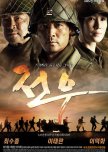“All wars are civil wars, because all men are brothers.” –Francois Fenelon
In the United States, that conflict which came to be called “The Korean War,” holds another designation besides: “The Forgotten War.” Several reasons exist for this, but chief among them is actually timing. Wedged between heroic World War II and hellish Vietnam, amassing fewer American casualties, and yielding little accomplishment, these hostilities are often overshadowed and thus rarely remembered (unless someone mentions M*A*S*H, of course). And yet for Koreans, that this war could be “forgotten” is unthinkable. Its effects are likened unto wounds that ache even today, dividing an entire people along the scar known as the DMZ.
So why stop to talk history? Because, when it comes to a powerful drama like Comrades, it just seems necessary. As many among us have come to know and love South Korea (and not just for excellent entertainment, but its culture and people also), we ought to be aware of the painful history which has molded it until now. After all, that sentiment seems to be at the heart of Comrades: the fervent wish for the viewer to understand.
What’s more, this drama helps one to do so in an entertaining and sincere manner, without the heavy-handed ideology, pointed fingers, or macho-man heroism which might muddy its message. The plot unfolds tightly, abandoning exposition and filler to allow characters and events to stand for themselves. The viewer is never spoon-fed or told what to think, and thus free to see Comrades as it is: a story of ordinary people thrust into extraordinary circumstances. That means that even soldiers from the North are portrayed humanely, whereas not everything in the South comes across as noble. A drama which pulls no punches with any aspect, and never insults the intelligence of its viewers is all too rare.
And so we see The Korean War from a uniquely Korean perspective, following various participants (from South and North Korean soldiers, to guerrilla fighters and even deserters). We learn their stories, each unique and fleshed out, and often come to feel for them no matter the “side.” Not only men are represented, either, with female combatants frequently appearing in the narrative (and well-handled, at that). Yet the best thing about Comrades might be the fabulous characters of 1st Squad, and the deep bonds which form between them. Viewers spend most time with these men, growing to adore them as they fight and survive together. The term “bromance” was invented for such touching male friendships, and I'll never use it lightly again.
Despite the fact battles often occur on screen and action plays an important part in Comrades, the involving and personal nature of the story is what will stick with viewers. Though it might make you cry from the gut, pump your fist triumphantly, or cover your mouth in disbelief, it’s a chance worth taking. For war film and history lovers, you’ll doubtlessly adore Comrades. But if you’re hesitating because this is not your usual type of show, stop! You’ll never see a drama quite like this again, as mature, well-made, and without fear. And the only regret you’ll have after? How pale it makes others seem in comparison.
Perhaps no better Korean ensemble cast yet exists than the one in Comrades. Ever-immaculate Choi Soo Jong headlines as devoted and fatherly Lee Hyun Joong, the sergeant in charge of 1st Squad. This character’s love and care for his men exceeds that of his own life. As I told a friend, Choi appears slight, yet his presence looms large and vibrant; more impressive is that he manages this with a surprising humanity and straightforwardness. I’m extremely attached to Sergeant Lee, even now: an incredible role for an incredible actor.
From Choi Soo Jong, it becomes difficult to single out anyone, but not because they flow together. On the contrary, each character is so well-defined and acted that should I stop to name everyone that stood apart, we’d be here for many more paragraphs. Instead, I’ll list some of the best: Kim Roe Ha (complicated Sergeant Park), Lee Seung Hyo (brash Private Jung), and Ryu Sang Wook (pious Medic Joo Yong). Kim Myung Soo and Jung Tae Woo are notable from the North Korean side, while Lee In Hye and Lee Tae Ran do the ladies proud.
Nothing is more delightful than finding a cinematic soundtrack in a drama. Well, being able to find every track with its title translated might be (as was possible with this one). Almost everything is memorable, with nary a false note to be heard from tense and exciting themes (“Kyrie”) to those equally quiet and painful (“Salute to the Deceased”). Many of my favored Korean dramas tend to include Insooni on the soundtrack, and here her soulful voice haunts the shattering ballad “I Will Come Back.” Among other important vocals are “Requiem for the Unknown Soldiers,” (Gloomy 30’s), and the enduring, folksy “Friends,” offered by Kim Jang Hoon—and on occasion, the boys of 1st Squad. After the final episodes, this is a song that might burrow its way into your heart forever.
Questa recensione ti è stata utile?























